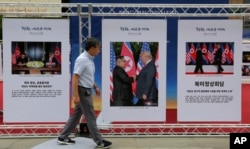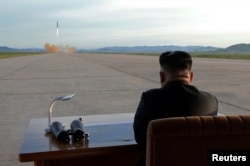U.S. President Donald Trump is scheduled to meet with South Korean President Moon Jae-in during the Group of 20 summit, where they are likely to discuss stalled nuclear negotiations with North Korea.
Experts said the meeting on the sidelines of the two-day gathering that begins Friday in Buenos Aires is unlikely to resolve the differences between Washington and Pyongyang over the North's nuclear weapons program.
The impasse began when North Korea abruptly canceled a planned meeting with U.S. Secretary of State Mike Pompeo in early November.
During his meeting with Trump, Moon is expected to push for a second summit between Trump and North Korean leader Kim Jong Un, according to South Korean news media reports.
Pressure and dialogue
Washington has been pursuing a dual policy of employing both pressure and dialogue simultaneously, as its differences with Pyongyang have been growing, while Seoul has been prioritizing improving ties with Pyongyang.
"I doubt the meeting between President Trump and President Moon at the G-20 meeting will break the stalemate in U.S.-North Korea talks," said Gary Samore, the White House coordinator for arms control and weapons of mass destruction during the Obama administration.
"Washington and Pyongyang remain very far apart on the scope and pace of denuclearization and sanctions relief, and neither side seems prepared to make major concessions at this time," he said.
Bruce Klingner, a former CIA division chief for the Koreas who is now a senior research fellow at the Heritage Foundation, also believes the deadlock will not end, because "Pyongyang refuses to engage" in high-level talks with Washington and is reluctant to give up its nuclear weapons program.
"The stalemate is due, as was the case of every previous failed attempt at diplomacy with North Korea, to the regime's unwillingness to abandon its nuclear arsenal," Klingner said.
Christopher Hill, a chief negotiator with North Korea during the George W. Bush administration, agrees.
"I think the major challenge is North Korea has not expressed any interest in denuclearization," he said.
Can Seoul move Pyongyang?
Hill suggested Trump should tell Moon that North Korea needs to take concrete steps toward denuclearization.
However, Dennis Wilder, the National Security Council's former senior director for East Asian affairs during the George W. Bush administration, questioned whether Seoul has the leverage to push Pyongyang toward that end.
"The only way that it will break the deadlock is if you believe somehow the South Koreans could convince the North Koreans to do the right thing," Wilder said. "I'm not sure that they have that power."
Some experts warn that Washington and Pyongyang could lose the momentum for dialogue if the current standoff persists.
Klinger said the upcoming summit could "underscore the growing divergence between Washington and Seoul over how to achieve North Korean denuclearization."
US still hopeful
Despite the stalemate, the U.S. insists that it remains hopeful that talks will resume.
Pompeo told reporters Wednesday that he was "very hopeful" that the U.S. will have "senior-level meetings before too long."
During Tuesday's press briefing, State Department spokeswoman Heather Nauert said, "We are in frequent contact with North Korean officials. That's not changed. We have our special representative, Stephen Biegun, who is leading those conversations."
North Korea accused the U.S. this week of using human rights issues — and a U.N. resolution condemning the country's human rights violations — as a tool to pressure Pyongyang.
According to North Korea's state-run newspaper Rodong Sinmun, "The reason that the Americans are so obsessed with this absurdity is that they want to sully the image of our republic in order to justify their racket for sanctions and pressure, and to extract our concessions in their negotiations with us."






